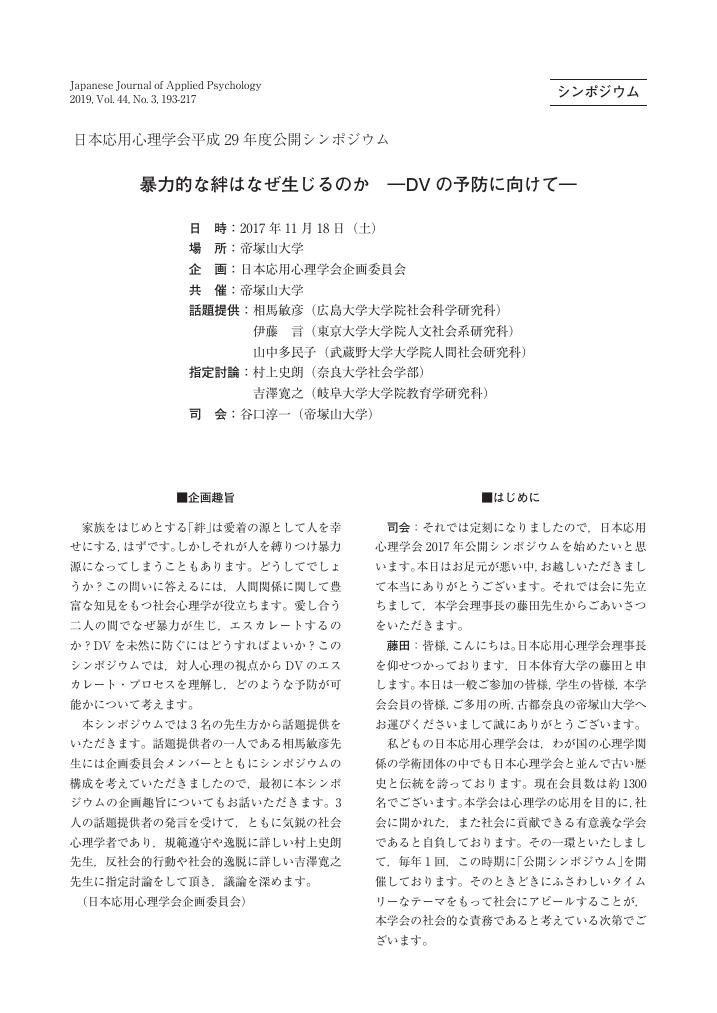8 0 0 0 OA ファンは「神」を信仰しているか? ファン心理の構造とその心理学的基盤
- 著者
- 伊藤 言 高野 陽太郎
- 出版者
- 公益社団法人 日本心理学会
- 雑誌
- 日本心理学会大会発表論文集 日本心理学会第81回大会 (ISSN:24337609)
- 巻号頁・発行日
- pp.2B-005, 2017-09-20 (Released:2020-03-27)
5 0 0 0 OA 16世紀に渡来した宣教師は日本人を“集団主義的”と評したか?
- 著者
- 髙野 陽太郎 伊藤 言
- 出版者
- 公益社団法人 日本心理学会
- 雑誌
- 心理学研究 (ISSN:00215236)
- 巻号頁・発行日
- pp.86.14331, (Released:2015-11-10)
- 参考文献数
- 42
Volpi (2004) pointed out that Alessandro Valignano, a 16th century Christian missionary, had considered the Japanese extreme collectivists. According to Volpi, his remark was based on Valignano’s reports (1583, 1592) edited by Alvares-Taladriz (1954). However, it is highly questionable whether Volpi examined these texts directly because the information about them provided by Volpi involved many serious errors. A thorough inspection of Valignano’s translated reports found no mention of Japanese collectivism. On the contrary, he had actually reported exceedingly individualistic behaviors of Japanese warriors. Such behaviors are consistent with what is widely known about the 16th century Civil Wars in Japan. It has thus turned out that no reliable evidence is present for the alleged observation by Valignano.
3 0 0 0 OA 暴力的な絆はなぜ生じるのか ―DVの予防に向けて―
2 0 0 0 OA 16世紀に渡来した宣教師は日本人を“集団主義的”と評したか?
- 著者
- 髙野 陽太郎 伊藤 言
- 出版者
- 公益社団法人 日本心理学会
- 雑誌
- 心理学研究 (ISSN:00215236)
- 巻号頁・発行日
- vol.86, no.6, pp.584-588, 2016 (Released:2016-02-25)
- 参考文献数
- 42
Volpi (2004) pointed out that Alessandro Valignano, a 16th century Christian missionary, had considered the Japanese extreme collectivists. According to Volpi, his remark was based on Valignano’s reports (1583, 1592) edited by Alvares-Taladriz (1954). However, it is highly questionable whether Volpi examined these texts directly because the information about them provided by Volpi involved many serious errors. A thorough inspection of Valignano’s translated reports found no mention of Japanese collectivism. On the contrary, he had actually reported exceedingly individualistic behaviors of Japanese warriors. Such behaviors are consistent with what is widely known about the 16th century Civil Wars in Japan. It has thus turned out that no reliable evidence is present for the alleged observation by Valignano.
1 0 0 0 16世紀に渡来した宣教師は日本人を"集団主義的"と評したか?
- 著者
- 髙野 陽太郎 伊藤 言
- 出版者
- 公益社団法人 日本心理学会
- 雑誌
- 心理学研究 (ISSN:00215236)
- 巻号頁・発行日
- vol.86, no.6, pp.584-588, 2016
Volpi (2004) pointed out that Alessandro Valignano, a 16th century Christian missionary, had considered the Japanese extreme collectivists. According to Volpi, his remark was based on Valignano's reports (1583, 1592) edited by Alvares-Taladriz (1954). However, it is highly questionable whether Volpi examined these texts directly because the information about them provided by Volpi involved many serious errors. A thorough inspection of Valignano's translated reports found no mention of Japanese collectivism. On the contrary, he had actually reported exceedingly individualistic behaviors of Japanese warriors. Such behaviors are consistent with what is widely known about the 16th century Civil Wars in Japan. It has thus turned out that no reliable evidence is present for the alleged observation by Valignano.

